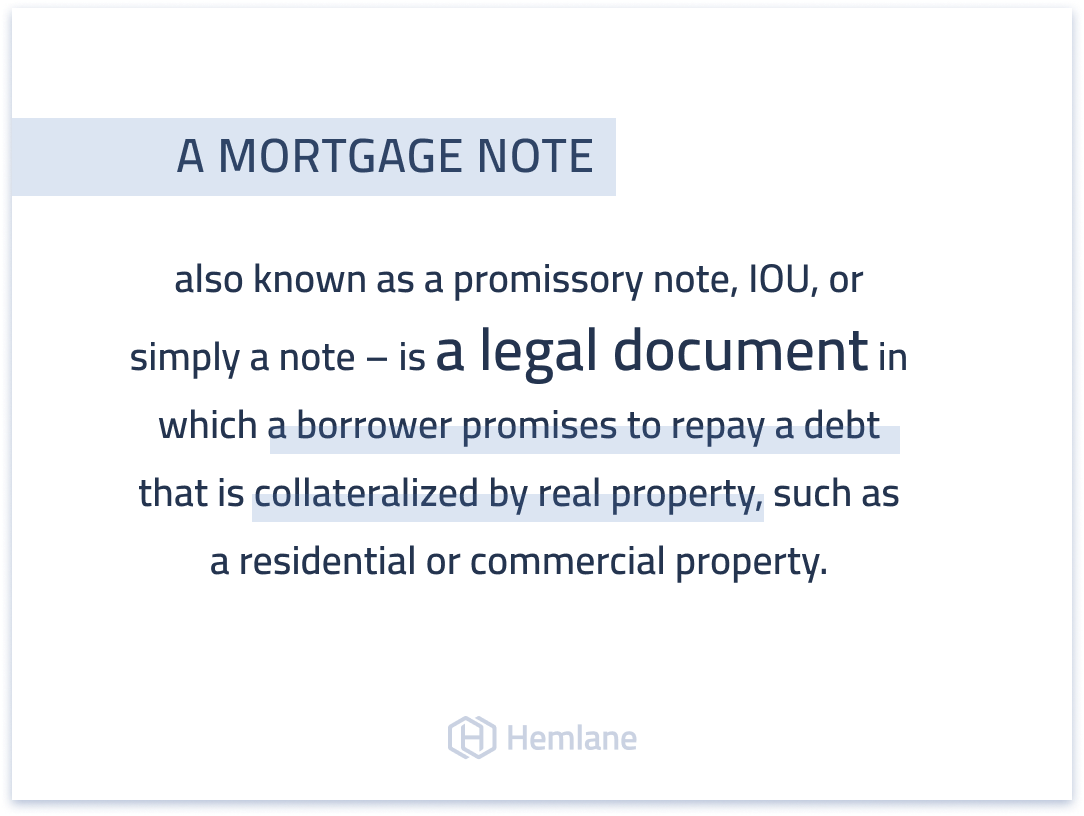What is a Mortgage Note? [+ how to invest in them]
The majority of real estate investors focus on equity and not debt. They locate a potentially good investment, put money down, then hire a property manager to take care of the property and pay the bills in order to generate a good return.
Mortgage note investing is an often overlooked way to invest in real estate. You can receive monthly cashflow while being more passive in your investments. In this article, we’ll discuss how mortgage notes work, and explain how to invest in them.
What is a Mortgage Note?

A mortgage note – also known as a promissory note, IOU, or simply a note – is a legal document in which a borrower promises to repay a debt that is collateralized by real property, such as a residential or commercial property.
The mortgage note document describes:
- Name of borrower
- Address of property
- Property legal description
- Amount of loan
- Interest rate (including percentage and whether rate is fixed or adjustable)
- Term of loan (in number of months or years)
- Default provisions
Main Types of Mortgage Notes
Mortgages notes can be categorized by asset class, type, note or lien position, originator, and by risk category:
Asset class
Mortgage notes come in different property types or asset classes, such as commercial and residential. Residential mortgages notes can include single-family homes, small multifamily buildings, and large apartment projects. Commercial notes include retail, office, and industrial properties.
Type
There are two types of mortgage notes: Collateralized or secured, or uncollateralized or unsecured. As the names suggest, a collateralized mortgage note is secured by the real property, while an uncollateralized mortgage note is only secured by the borrower’s promise to repay but not with a forfeitable asset.
Lien position
First-lien mortgage notes have priority and are paid off first in the event of borrower default. On the other hand, second-lien notes are subordinate and are second in line to be paid, assuming there are any funds remaining. Examples of a second-lien mortgage note include a home equity line of credit (HELOC) or a second mortgage used as a partial down payment.
Originator
Institutions such as banks and credit unions originate mortgage notes, along with private parties including a seller financing the sale of a property or a group of investors pooling capital for hard money lending.
Risk category
Mortgage notes fall into one of two risk categories. Performing notes are those where the borrower is current and making payment on time. Non-performing mortgage notes (also known as distressed notes) are when the borrower has fallen behind on the payments and is facing foreclosure.
Are Mortgage Notes Good Investments?
All types of mortgage notes can be good investments, even distressed mortgage notes, depending on the risk-reward profile of the individual investor.
Mortgage note investors seeking a relatively reliable bond-like return may find a performing note on an asset such as a single-family home to be an attractive investment. The note is secured by real property and the borrower may be more likely to continue making the mortgage payments, especially if the home is a primary residence and the borrower has a good credit rating.
Note buyers willing to accept more risk might choose to purchase a non-performing note secured by real property in order to generate a higher rate of return. If the borrower defaults on the loan, the note holder has the right to foreclose on the property, make any needed repairs and sell it, rent the property out, or resell it by offering the buyer a new mortgage note to generate interest income.
How to Invest in a Mortgage Note
Here’s how the mortgage note origination process works and how to invest in a mortgage note:
- Mortgage note is created when an institutional or private party loans money to a borrower to purchase real property.
- Lender obtains a promissory note that describes the property address, borrower, loan amount, interest rate, loan term, and default provisions.
- Borrower owns the real property and makes monthly principal and interest payments to the lender.
- Bank or private party that originated the mortgage note wants to turn the mortgage note into cash and sells the note to another investor, often at a discount to face value.
- Mortgage note is assigned or transferred to the investor who now receives the monthly principal and interest payments from the borrower.
Pro Tip: Work with an experienced mortgage broker who has a background in mortgage notes and real estate investing generally.
Example of How a Mortgage Note Investment Works
Now let’s look at an example of a mortgage note investment.
Assume a $100,000 house was sold by an owner who offered to carry back the note with seller financing. The buyer made a down payment of $15,000 and agreed to a mortgage of 8% fixed-rate interest with a 20-year term.
Over the past three years, the borrower has been making the $710 monthly mortgage payment (principal and interest) on time, and the outstanding loan balance is down to $79,371.
The seller who currently holds the note wants to raise cash, and agrees to sell the mortgage note to another investor for $63,497, which is a 20% discount to the remaining loan balance.
That means the mortgage note investor paid $63,497 for a note with a balance of $79,371 and will receive monthly principal and interest payments of $710 per month in passive cash flow for the next 17 years. In this example, the investor would earn an IRR of 11.216%, assuming the note performs over the holding period.
Potential Risks of Mortgage Note Investing
While there can be a significant amount of upside to investing in a mortgage note there are also potential risks investors should be aware of as well.
Unlike putting money in a certificate of deposit, mortgage notes are not insured by the FDIC. If the borrower defaults, the holder of the mortgage note would need to pay for foreclosing and evicting the homeowner.
That’s why it’s important to thoroughly research the real property securing the note and the credentials of the borrower, such as credit profile and employment history.
Where to Find Mortgage Notes for Sale
Traditional lenders such as banks and credit unions are one source for buying mortgage notes, although it can be difficult for the individual investor to buy one note directly from a bank. Oftentimes institutional lenders prefer to sell mortgage notes in bulk to hedge funds or REITs invested in debt.
Online mortgage note marketplaces such as Annuity.org, LoanMLS, and Notes Direct can be good places to find mortgage notes for sale. Some commercial real estate listing websites including CREXi and Fundrise can also be good resources for locating notes for sale and opportunities for investing in debt.
Final Thoughts on Mortgage Note Investing
What is a mortgage note? In sum, it’s a legal document and debt instrument in which the borrower promises to repay a debt that is collateralized by the property.
Investing in mortgage notes can be a good way to generate a steady stream of passive income without having to actively manage real estate by being a landlord. Since a mortgage note represents debt and not equity, investors purchasing a performing note may see more downside protection if the economy enters a recession and homes decrease in value.
Because first-lien mortgage notes are first in line to get paid, investors can foreclose on a property if the borrower defaults, then resell the real estate or fix it up and rent it out to begin generating more recurring income.
Real estate investing is about using the tools you have put in your investor toolbelt. Mortgage note investing is one such strategy investors can deploy to create a new stream of investing income. As with anything, there are certainly risks, and it’s critical investors work with an experienced team of professionals, including a lawyer and broker.
Get the Latest in Real Estate & Property Management!
I consent to receiving news, emails, and related marketing communications. I have read and agree with the privacy policy.





